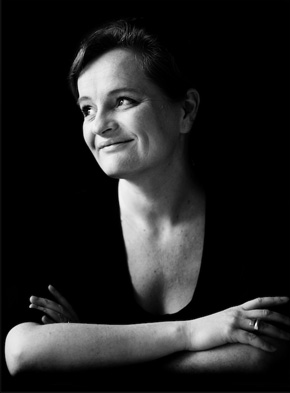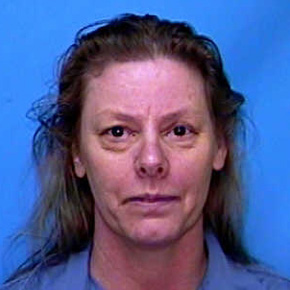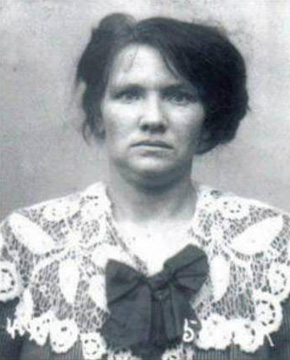Female killers
by Dorthe NorsWhen she goes to bed, which is earlier and earlier now, he stays up at the computer. He checks the weather, reads an online tabloid, and plays backgammon with someone who says he’s a retiree. Who wins is an open issue, and shortly after midnight the retiree logs off. So then he surfs around, visiting a variety of websites, these days thinking about things he hasn’t thought about since he was a child. People who can predict things. Clocks that stop when someone dies. Calves with two heads, and women who kill people. The latter is an anomaly, and yet he has noticed that perpetrators in TV crime shows are most often women. He knows it’s a technical thing: a desire to surprise the viewer. In the real world it’s men who kill, but even when he googles killers, Aileen Wuornos crops up everywhere, and she’s a scary one.
Her upbringing was full of violence and alcohol, and at the age of thirteen she was pregnant. No one knew who the father was, most likely not even Aileen herself, who claimed to have had many sexual partners, including her grandfather and her brother. The child to which Aileen gave birth was placed for adoption and Aileen worked as a prostitute through school, her destructive behavior gathering momentum with charges of drunk driving, assault, and unlawful possession of firearms. Aileen ended up earning money as a highway hooker using names like Sandra, Cammie, and Susan at truck stops in Florida. Her first victim was an electrician. His car was found not far from the freshwater swamps of Tomoka State Park. In the grass by the car they found his empty wallet, some unused condoms, and a half-empty bottle of vodka. A few days later they found the electrician himself, shot three times in the chest with a .22-caliber pistol. After that she went crazy. That must have been it, he thinks to himself, with the same feeling he had when he was a child and dug up the dead birds after he had found and buried them.
They gave Aileen Wuornos six life sentences, one for each man they could prove she killed, and toward the end of her incarceration she claimed her brain was being controlled by radio waves and she would be kidnapped by angels in a spaceship: I’d just like to say I’m sailing with the Rock, was the last thing she said before they gave her the injection. I’ll be back, like Independence Day with Jesus. Big mother ship and all, I’ll be back.
The odd thing about Aileen is that she was the kind of person you could have had fun with in a bar when you were young, if the chance came around. Maybe that’s why she opens doors in the mind. Doors, stairwells, and pantries. She makes tracks through the undergrowth, to places with abandoned cars. He can smell the soil and rust when he thinks about her. It’s okay, though not unambiguously so, because it feels like an opening along the breastbone, and out of the opening seeps every thing a person is not supposed to touch: vipers, game killed in traffic, and liver spots. He thinks too about the child she gave up for adoption when she was thirteen. That child has to be out there somewhere, and he imagines him grown up and coming back from the public office where you can get information on your biological parents. Aileen Wuornos, the birth certificate would say, father unknown. Afterward the child would google his mother’s name and get 224,000 hits.
Once in a while everyone wishes someone dead, though no one should ever kill. It’s human to consider it sometimes. People who drive recklessly in densely settled areas close to schools and kindergartens. Threats issued in dark alleys generally license killing, in the same way as unlawful confinement or being a soldier at war. Marginalization is no excuse, and neither is seeing a woman in the supermarket at closing time putting groceries into the shopping cart of a man like the one he remembers from childhood who used to play the banjo at get-togethers in the community hall. Balding and flabby, with thin arms and a yearning to be possessed by something big. The kind of person you feel for, the way you feel for horses and cows whose hind legs are going lame and who are unaware that the faint sound of metal on metal in the darkness of the shed is the sound of cartridges being loaded into a gun. Kill or be killed. Thoughts like that are free. Fun, even. Though not for Aileen Wuornos’s biological child. Not with 224,000 hits for his mother’s name on Google.
Sentenced to death for eight of the twenty-five infant killings she is thought to have committed. They called her the Angel Maker, and it’s the way she did it that puzzles him.”
He looks at his hands. His right hand is on the mouse, and when he switches off the computer in just a moment he knows he’ll feel like he did when he used to look at Playboy. Even after the magazine was hidden away he could still sense the sweet smell of spit on the glossy page. And yet he keeps clicking, to Dagmar Overbye. It’s what he wants right now: to vanish into her tiny rooms on the web, and she is dark, full, and rather out of focus, like something from a fairy tale. It’s hard to relate to her having been a real person, though she was. Sentenced to death for eight of the twenty-five infant killings she is thought to have committed. They called her the Angel Maker, and it’s the way she did it that puzzles him. She put a notice in the paper for young women in unfortunate circumstances and promised to discreetly arrange adoption for a fee. But when she got the money and the young mother had gone, Dagmar, out of her mind on naphtha and ether, did away with the child. She put one of them in the toilet, another she wrapped up in newspapers, then took her daughter by the hand and went out to bury it. During the trial it came out that as they were walking the bundle slipped from Dagmar’s hands: Mother dropped her parcel, said the daughter, and it’s impossible to imagine what it must have been like to have such a mother.
He remembers his own as a dry rustling sound, always bent over work: a kneading board, trays of bread buns, minced pork, layer cakes, and See how he runs! And when he thinks of her it’s by the cherry tree in the front garden.
But Dagmar is in fog, a bitter cold morning in Copenhagen, and she is standing still in a black dress with puffed sleeves and laced boots. She has a parcel under her arm, wrapped in newspaper, and that’s what seeps in and out of his chest.
The parcel, and the thought of the twenty-five small bodies she concealed in attics or burned in the stove, and the fact she was never able to explain why she did it. She was out of her mind on naphtha, she said. It was like being in a dream that couldn’t be described.
He knows it’s hard for normal people to understand the part that couldn’t be described. Dagmar Overbye wasn’t normal, but when he did his military service they said women could be good and efficient fighters. They could even be vicious. All they needed was to cross over a line, the sergeant said. Once they’d crossed it they had no problem with killing. Personally he has no wish to know what line that is, but something tells him that in the cases of Dagmar and Aileen there must have been some foregoing demoralization. Damage set off by comfortless upbringing, perhaps even a kind of mental illness. It would explain a lot, if that were the case. It would make things understandable. Anomaly is within the bounds. The abnormal can be accepted, it can even open doors in a person and make room for everyone to be human, he thinks. But then it might be something else altogether. Something more frightening.
He remembers a night not long ago when he stayed up after the retiree had logged off. That night he read online in the tabloid that chimpanzees were able to make spears for hunting. A team of scientists in the West African state of Senegal had observed behavioral changes in apes in an area without food. He read how they noticed the apes began to hunt with spears. That was one thing, but only the young apes and the females did so. The old males sat around and starved, the article said. They weren’t good at thinking new thoughts, a female scientist commented. She talked about how with her own eyes she had seen a female chimp spear one of the monkeys the locals called bush babies. This particular bush baby lay sleeping in its den, and the scientist described how the chimp used the spear to prod the monkey out of the den and then killed it and ate it. That same night he googled bush baby and the screen filled up with pictures. They had big, black, bulging eyes and were by nature clearly terrified, like Dagmar’s twenty-five infants or Aileen Wuornos’s biological child just after reading the first article about his mother. That’s what the bush babies looked like, paralyzed with fear, and yet the old males just sat around waiting to be possessed by something big. A savannah full of males with banjos, he thought, and females with hair under their arms. And spears.
He switches off the computer and turns on the desk lamp. He sits still with his hands on his knees until the hard drive has stopped whirring. They make up all sorts of things, he thinks to himself. Then he takes off his shoes so as not to make a noise when he goes up the stairs to her.
From Karate Chop, translated by Martin Aitken.
 Dorthe Nors was born in 1970 and is one of the most original voices in contemporary Danish literature. She holds a degree in literature and history from Aarhus University and has published four novels, in addition to the collection of stories Karate Chop and the novella Minna Needs Rehearsal Space. Her stories have appeared in numerous publications, including Harper’s, the Boston Review and The New Yorker. She was awarded the Danish Arts Agency’s three-year grant for “her unusual and extraordinary talent” in 2011, and in 2014 Karate Chop won the prestigious P.O. Enquist Literary Prize. Karate Chop, translated by Martin Aitken and Minna Needs Rehearsal Space, translated by Misha Hoekstra are published in a striking tête-bêche paperback by Pushkin Press.
Dorthe Nors was born in 1970 and is one of the most original voices in contemporary Danish literature. She holds a degree in literature and history from Aarhus University and has published four novels, in addition to the collection of stories Karate Chop and the novella Minna Needs Rehearsal Space. Her stories have appeared in numerous publications, including Harper’s, the Boston Review and The New Yorker. She was awarded the Danish Arts Agency’s three-year grant for “her unusual and extraordinary talent” in 2011, and in 2014 Karate Chop won the prestigious P.O. Enquist Literary Prize. Karate Chop, translated by Martin Aitken and Minna Needs Rehearsal Space, translated by Misha Hoekstra are published in a striking tête-bêche paperback by Pushkin Press.
Read more.
dorthenors.dk
Author portrait © Simon Klein Knudsen
Read our interview with Dorthe Nors.




